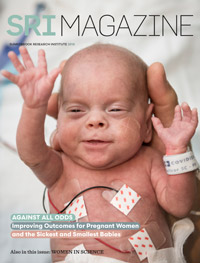Discovering the drawbacks of double-booking hip surgeries
Overlapping procedures prove problematic
A controversial practice is overlapping surgery, or double-booking. It occurs when a single attending surgeon is tasked with simultaneously supervising two or more procedures in separate operating rooms. One might say it’s an effective use of resources, but others argue it jeopardizes care.
In the first population-based study to evaluate the implications of overlapping operations at the health system level, a team conducted research into whether these surgeries for hip fractures and hip replacements led to complications up to one year later. Complications examined included infection, dislocation and revision, meaning follow-up surgery performed to correct a misstep from a previous procedure.
Sunnybrook Research Institute scientist Dr. Hans Kreder and associate scientist Dr. Bheeshma Ravi, both in the Holland Bone and Joint Research Program, led the study. The orthopaedic surgeons looked at more than 90,000 operations in Ontario between 2009 and 2014, of which 960 were overlapping hip fracture surgeries and 1,560 were overlapping hip replacement procedures. They defined overlapping as overlap between operations lasting at least 30 minutes.

Cartoon: Leo Cullum / The New Yorker Collection / The Cartoon Bank
Although relatively rare, these surgeries were found to be associated with drawbacks. The discoveries, published in JAMA Internal Medicine, showed that overlapping procedures were linked to a roughly 90% rise in the risk of complications. These complications were directly tied to the technical aspects of the surgeries themselves. The risk for complications grew as the length of overlap increased, and it was noted that the risk of complications in overlapping hip fracture procedures was greater than that in hip replacement surgeries.
Despite the relative rarity of double-booking for these surgeries in Ontario, the findings underscore the need for surgeons to tell patients during the informed consent process if they will be performing another operation at the same time.



